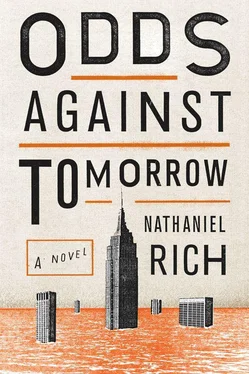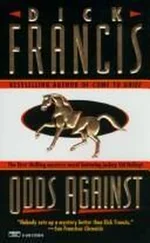Jane started laughing then — her unruly arpeggioed laughter, a laughter that climbed through the broken windows, kicked off its shoes, and danced in the abandoned rooms. She turned around to look at Mitchell. It was probably an effect of the grease, but her face was shining.
“Poof!” she said. “Poof!”
Nybuster was right. Living in fear was no kind of life. Not long ago — that very morning! — Mitchell had been weak. Soft fibered. Defeated every morning, defeated every night.
No more.
6.
“I haven’t had these since I was ten,” said Jane, her lovely, delicate teeth decapitating a tiger.
Mitchell’s mouth was full of crackers so he could not immediately reply.
“Noah took two of every animal,” he said at last. He reached into the box for another cracker. “So did I.”
They had wedged themselves between the wide crowns of two oak trees near the northeastern corner of Central Park. Manhattan was narrower up here, the water deeper; Mitchell suspected that the Hudson River had flooded as well and the two rivers had converged in the middle, as in the era of the Lenape Indians. Branches poked from the water, their shredded leaves floating in the tide.
“FutureWorld,” said Jane. “When it rains, it floods catastrophically.”
“FutureWorld,” said Mitchell. “Don’t go with the flow.”
“FutureWorld: when the going gets tough, the tough jump into a tie-dyed canoe like a couple of half-wits.”
They were sitting at the height of nesting birds. Baffled sparrows pecked at the water and then hurried back to the treetops, cautious and uncertain. The trees along Fifth Avenue had served as a kind of filter — their branches were cluttered with garbage — but in the interior of the park the water was calm and unusually clear. You could follow the brown trunks down for several feet below the surface. This underwater forest had seemed a good place for a noontime snack, hidden away from the rest of the floating city. They’d removed their PFDs, and Mitchell took out his last box of animal crackers. As soon as he cracked the box, he realized he was starving.
“Another thing I’ve been meaning to ask you,” said Jane. She took a rhinocerous and nibbled on its tusk.
Mitchell braced himself.
“Who’s that?” She pointed to his T-shirt.
“Oh.” He looked down. “It’s an old shirt. I mean, high school old. His name is Leonardo Fibonacci. You know, the Fibonacci sequence?”
Jane laughed, shaking her head. “Ah. Good old Leonardo Fibonacci. I didn’t know people silk-screened shirts with his face on it.”
“ People don’t. But I did.”
“This flood is making me bughouse crazy.”
Jane’s forehead was smudged black from the floodwater and her hair tangled in muddied clumps. But still her face retained its brightness. Even now, bedraggled and exhausted, the light was still on. Only twice, briefly — first when it seemed they were trapped in the apartment and later when they had passed the woman stranded with her infant — had the light gone out. He couldn’t help his mind’s eye from drifting back to the previous night. Her hair falling on his face like a caress, the action of her hips, her warm hands.
She was looking at him as if she’d read his mind.
“What happened last night,” she said.
“Yes.”
“It was an extreme situation.”
“I know. This is an extreme situation too.” He gestured at the tree canopies that boxed them in like a garden maze.
“Right,” she said. “Exactly.”
Mitchell fed a zebra into his mouth.
“I’m trying to say that I like you,” she said. “A lot. And not just because today, well, I don’t know any other way to say it: you probably saved my life. It’s just that—”
“We’re not out of the woods yet.”
She laughed. “I do like you.”
“Don’t worry about it.”
He actually felt relieved. Earlier that afternoon he’d prepared a little speech, explaining that he had no expectations. He was planning to say something like It was a crazy night, but that’s all it was, one night. Neither of us is exactly in a position to look for anything more … involving.
Jane relaxed. “I’m glad we agree. You won’t take it personally. Just as I won’t take it personally. We can be friends and forget it ever happened.”
Mitchell nodded and tried to smile. “Bowwoman and Sternman. Paddling to salvation.”
Jane tossed her cracker box over the side of the canoe.
“I know — don’t litter.”
“You get a pass.”
The box drifted into a small current that trailed between two leafy islands several dozen yards distant. Then, with a plop, it sank into the water — pulled under by something swimming there. But it seemed to have been rejected, for a few seconds later it bobbed back to the surface.
Jane shook her head. “The loss of life, the damage. It’s incalculable.”
“Don’t think about it.”
“That seems to be your approach — not thinking.”
“I haven’t figured out anything better.”
“Maybe you should try.”
“Maybe I will. Later.”
“That’s the thing — the scale is too great. It’s impossible. We can only see what’s immediately in front of us. It’s difficult to imagine the next avenue, let alone the entire city. All the people.”
“Most people were smart enough to evacuate,” said Mitchell.
“Let’s be wildly optimistic. Say ninety-nine percent evacuated. There are one million five hundred and eighty-five thousand people on the island of Manhattan. What’s one percent of that? Fifteen thousand?”
“Fifteen thousand eight hundred and fifty.”
“So fifteen thousand eight hundred and fifty people didn’t get out.”
Mitchell didn’t know what to say. Bubbles rose to the surface several feet from the canoe, gurgling loudly.
“Not to mention the museums, the libraries, the theaters.”
“The big ones will be safe. They were built on rock, Manhattan schist. The museum founders thought about floods. So did the rich, who built their mansions on Fifth Avenue — as far away as possible from both rivers. High ground. The central library stands on the side of a hill, eighty feet above sea level.”
“Grand Central was flooded.”
“It’s all rock: limestone, marble, granite. It’ll be fine.” He was not going to mention the bodies. Maybe not ever, to anyone.
“What about the United Nations? That’s right on the river.”
“The UN is in trouble. It was built on land twelve feet below sea level.”
“So the Secretariat Building is a fish tank now.”
“It’s a sunken ship in the East River.”
“Maybe the very unreality of it all is what’s making me come back again and again to the same terrible thought. I just can’t shake it.”
“That you’re just happy to be alive?”
“Yes,” said Jane. “That is nice, of course. But that’s not it.”
“You can say it.”
She paused, trying to find the right words. “I suppose it’s something like this: if the storm was so horrific, then why is everything now so beautiful?”
As if on cue, a large black bird swooped over their heads, so low that the water rippled beneath its rush. The crow shrieked as it flew past and landed on a branch several yards away from them. It perched there unsteadily, maneuvering for balance, its talons scratching the bark, its vast wings beating several times in quick succession. Finally it settled. Slowly, with a regal, almost contemptuous motion, it rotated its head to examine the two figures sitting in the garishly stippled canoe. Mitchell and Jane watched in awe. No doubt perturbed by the sight of such large creatures so high in the sky, the crow sprang from the branch with a loud clap of its wings. They watched it soar in the direction of New Jersey.
Читать дальше












